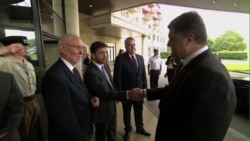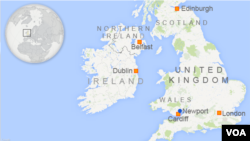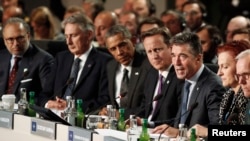U.S. officials say Russia faces new sanctions for continuing to support rebels fighting government forces in Ukraine. The crisis has been the center of discussions at a NATO summit in Wales, as President Barack Obama and other leaders prepare Friday to announce their next step in dealing with Russia.
NATO Secretary General Anders Fogh Rasmussen on Thursday accused Moscow outright of attacking Ukraine and told the Kremlin to pull back Russian troops from Ukraine and to stop supporting rebels in eastern Ukraine.
“We call on Russia to end its illegal and self-declared annexation of Crimea,” he said at a meeting with Ukrainian President Petro Poroshenko at the NATO summit near the Welsh city of Newport.
“We call on Russia to pull back its troops from Ukraine and to stop the flow of arms, fighters and funds to the separatists,” Rasmussen said. “We call on Russia to step back from confrontation and take the path of peace.”
Earlier Thursday, the NATO chief had dismissed Russian President Vladimir Putin’s seven-step plan to end the fighting in eastern Ukraine, deriding Putin’s approach as a “so-called peace plan.”
Rasmussen said what counts is what is happening on the ground in eastern Ukraine, where the West says Russian troops are fighting with separatists against the Ukrainian military, a charge Russia denies.
NATO estimates there are at least 1,000 Russian troops in Ukraine.
The West has ruled out military intervention in Ukraine, which is an alliance partner of NATO, not a full member that other NATO countries would be obligated to defend. Rasmussen said it is up to individual countries to decide whether to provide any form of military aid to Kyiv.
As the meeting opened, Russian Foreign Minister Sergey Lavrov sternly warned that any Ukraine move to join NATO would "derail efforts" toward a cease-fire.
Western nations have already imposed wide economic sanctions on Russia and say they are considering other measures.
Crises on agenda
Rasmussen's comments stepped up Western rhetoric against Moscow and set the tone for a two-day meeting marked by a return to east-west confrontation 25 years after the fall of the Berlin Wall.
NATO members are meeting at a golf resort outside the town of Newport, Wales.
U.S. President Barack Obama and his 27 allies plan to discuss how to tackle the Islamic State group that has claimed territory in Iraq and Syria and has emerged as a new threat on the alliance's southern flank, as well as how to stabilize Afghanistan when NATO forces leave at year's end.
After the leaders met with Ukrainian Poroshenko Rasmussen said the alliance would make a joint declaration on the crisis, and agree on what he called “concrete steps” to enhance their cooperation with Ukraine.
NATO is also planning to create a rapid-reaction force to enhance its military presence in member states close to Russia, and to deter, and if necessary respond to, any Russian military moves in those areas.
Russia, which has strongly opposed any NATO presence near its borders, has denounced the idea of a rapid response unit. Earlier this week, Russia said it will review its own military strategies in eastern Europe if NATO endorses creation of the force.
Afghanistan
The NATO leaders also conferred about Afghanistan, where their combat mission will end in December and they hope to launch an advisory and training mission next year.
Rasmussen said NATO is ready for the final stage of the transition of its mission from combat to a training and advisory role, as planned. But he said that cannot happen unless the new Afghan president signs agreements on the status of foreign forces in the country.
However, the alliance is waiting for the results of the disputed Afghan presidential election to get the agreement signed.
Afghanistan's rival presidential candidates, Ashraf Ghani and Abdullah Abdullah, sent a message to NATO leaders on Thursday saying that they will do their utmost to reach a political agreement that would end a crisis over disputed elections.
Rasmussen’s comments followed a three-hour meeting about Afghanistan by NATO leaders and officials from 27 other countries that have troops in the country or provide various types of assistance.
The leaders formalized plans for continuing financial assistance for Afghanistan and in further building its security forces.
Rasmussen described this as a “crucial summit at a crucial time,” and one of the most important in the alliance’s history.
Islamic State group
Rasmussen said he believes the broader international community "has an obligation to stop Islamic State fighters from advancing further," but noted that the alliance hasn't received any request for help.
"I'm sure that if the Iraqi government were to forward a request for NATO assistance, that would be considered seriously by NATO allies," Rasmussen said.
The Islamic State militants have claimed responsibility for murdering two American journalists, releasing gruesome videos of their beheadings. Both the U.S. and Britain are deeply concerned about the potential threat to their homelands that could come from the foreign fighters who have joined the violent Islamic State group.
The U.S. began launching airstrikes against Islamic State targets in Iraq last month, and both the U.S. and Britain have been making humanitarian aid drops to besieged minority groups there.
Cameron said that he hadn't ruled out joining the U.S. in airstrikes, but added that the priority was to support those already fighting the militants on the ground.
"We need to show real resolve and determination, we need to use every power and everything in our armory with our allies - with those on the ground - to make sure we do everything we can to squeeze this dreadful organization out of existence,'' Cameron told the British network ITV.
The summit continues Friday with the focus on the security of NATO members that border Russia.
But former British official Nick Witney, now at the European Council on Foreign Relations, told VOA such moves may be important but don’t directly address Russia’s actions in Ukraine.
“There is a certain amount of displacement activity, if you like, in worrying about how we can improve the defense of the Baltics and Poland and so on, when frankly there is not a serious Russian threat to those countries,” he said.
Al Pessin contributed to this report from London. Some material for this report came from Reuters and AP.














